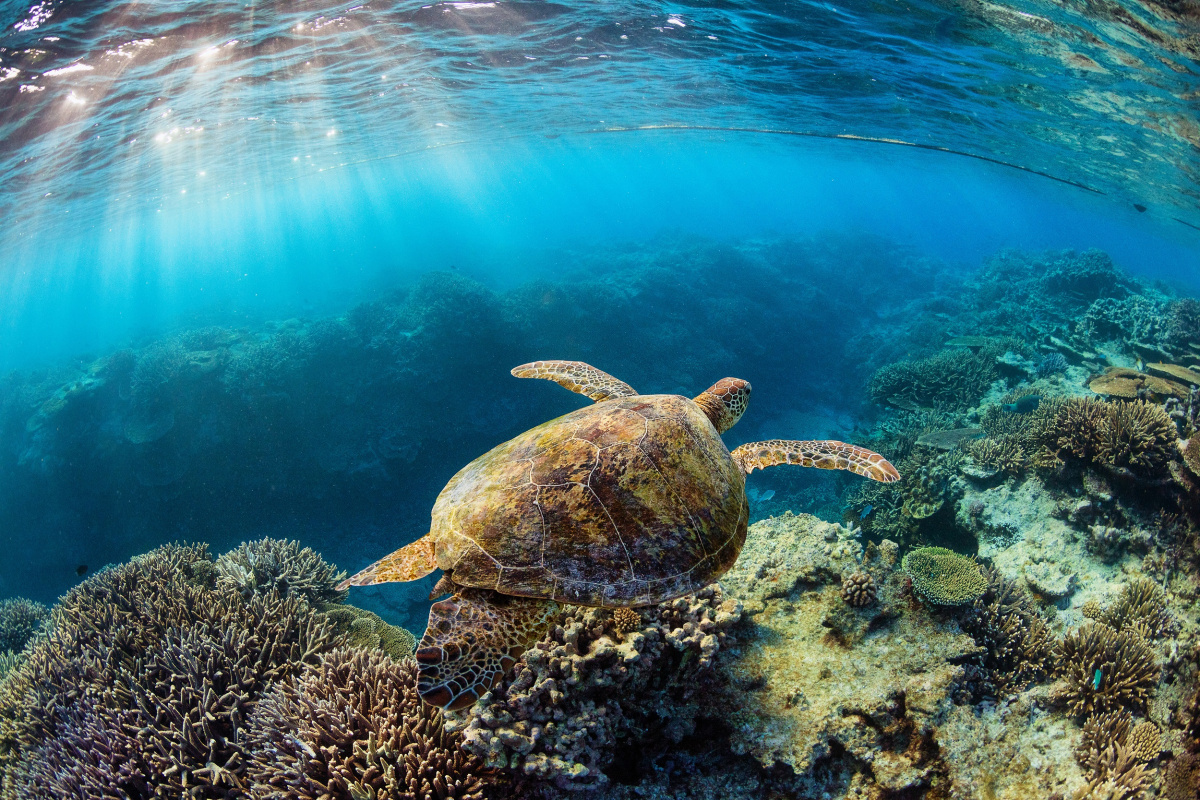Giving back
It has been over a year since Fiji had its first case of COVID-19, now a 2nd, highly contagious variant of the virus is going rampant across the country. As of 30th May 2021, Fiji recorded 401 cases since the virus was first recorded in March 2020. In the period April to May 2021, a total of 331 cases alone were registered, reflective of the rapid community transmissivity of the B161 Indian variant.

Photo: A turtle swimming among the corals by Jordan Robins/Ocean Image Bank
Following the announcement of the first known community transmission case, the Fijian Government announced a range of measures including the setting up of containment areas in multiple areas across Fiji’s main island, Viti-Levu, complete lock-down of some areas with known transmission cases mainly on Viti-Levu and a complete shut-down of many economic activities in these areas. At least 5% of the Fijian population were displaced during this period of sudden announcements of lock-down and containment areas. Families and individuals were separated in some instances while in others some families faced an increased burden of having to take in and provide for additional family members or friends unable to return to their original homes.
Now in its sixth week of rising cases each day, this second wave has almost crippled the local economy, making the task of accessing basic needs even more difficult for most. While the impacts and effects of the current wave would be felt by many, one group which would bear the full brunt of such a crises are our fisher communities, who rely on our vast and healthy ocean spaces for food and a source of income.
Despite being large oceans states, many countries in the Pacific, including Fiji, are burdened with the ongoing climate crisis, over-exploitation of natural resources, degradation of both our terrestrial and marine environment resulting in rapid losses to biodiversity, culture and our way of life for many. A few fundamental question remains at the back of our minds as we navigate these uncharted Covid-19 waters. How are we going to recover from all of these economic and social losses? Who will see us through these difficult times? Will Government and family support be sufficient? Will we ever go back to living life the way we used? Quite remarkably, the answers to these questions brings us back, almost reconnects us back to the interconnected relationship between our environment and ourselves.
As conservationists, we are reminded that in in order to create healthier, more resilient societies, we need to implement a holistic approach to public health and environmental health. Recognizing the underlying causes of the problem can take us from the usual approaches to conservation that are no longer sufficient to change our path. A new order of business is warranted. One in which our social well-being is not at the cost of our environmental/ ecological health. The new world, the new normal must embrace our living wealth, take on the responsibility of sustainably and equitably managing and using them as much as they do for us and would continue to do for us in future.
As the world marks yet another year of World Oceans Day on 08th June, many Fijians will look to the oceans, to the land and waterways that connect us for comfort, for solace during these trying difficult. Praying, hoping that with each passing day, look forward to returning to their land and oceans from where they would once again find food and earn a living. As we embrace and celebrate this day, will it be too much to ask ourselves about what we’ve done for our oceans in return rather than constantly highlight the multitude of good and services we have received and continue to obtain from it?
By Alisi Rabukawaqa-Nacewa and Chinnamma Reddy
